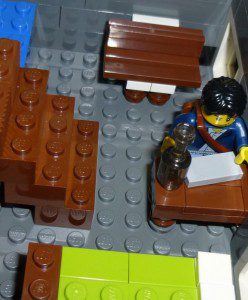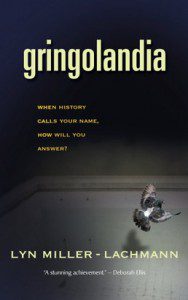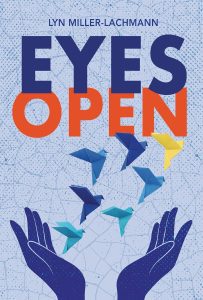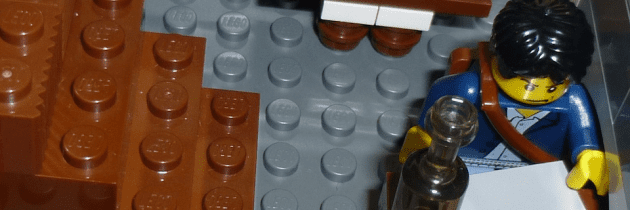A Creative Crisis
It’s not uncommon for authors to publish one or more books and then drop out of sight. Readers who appreciate the works of that author and expect a new book start to wonder. What happened? Did my favorite author just…stop writing? Are they even alive?

Patricio, our Pubrickster Prize-winning investigative journalist, dreams of being a poet. He sits at the desk in his basement room, but his laptop remains shut because the words won’t come.
Years ago, I was that author. Yes, I was alive. No, I did not stop writing. I wrote manuscript after manuscript that never found a publishing home. Eventually, I honed my craft with workshops and tried new ways of telling stories, including nonfiction, verse novels, and a multiple-point-of-view collective protagonist narrative. After a seven-year publishing gap, I returned with many new books. Four came out in 2022. I had one book of my own and one translation in both 2023 and 2024.
Then, as I pondered two different new projects, with editors waiting, I experienced a crisis. I alluded to it in talking about my failed New Year’s Resolution for 2024. But I feel I owe you, dear readers, a longer explanation, because it may be a while before you see my next book.
 Although I’ve written in a number of areas, the books that are closest to my heart are the three YA historical novels that feature teens living under dictatorship or, in the case of Gringolandia, in exile in the midst of a dictatorship. Gringolandia portrays 17-year-old Daniel, living with his mother and younger sister in Wisconsin in 1986, having left Chile shortly after the arrest of his journalist father. When his father is suddenly released and rejoins the family in exile, Daniel hopes for the relationship they had before his arrest, but both of them have changed too much. (There’s also a companion to Gringolandia from the perspective of Daniel’s younger sister, Tina, for those seeking to know what happened once the dictatorship ended.) Like Gringolandia, my most recent YA novel — and first sole-authored verse novel — Eyes Open, is set under a right-wing dictatorship. In this case, it’s the theocratic regime of António Salazar in Portugal in 1967 — many years before the Carnation Revolution that brought democracy to Portugal. Sixteen-year-old Sónia’s boyfriend is in prison for distributing anti-government publications and she and her friends write poetry to honor him, but when she’s forced to leave school and work a demanding, dangerous job in a hotel laundry, she has to choose between writing poems to honor a hero or standing up to be the hero herself despite the risks.
Although I’ve written in a number of areas, the books that are closest to my heart are the three YA historical novels that feature teens living under dictatorship or, in the case of Gringolandia, in exile in the midst of a dictatorship. Gringolandia portrays 17-year-old Daniel, living with his mother and younger sister in Wisconsin in 1986, having left Chile shortly after the arrest of his journalist father. When his father is suddenly released and rejoins the family in exile, Daniel hopes for the relationship they had before his arrest, but both of them have changed too much. (There’s also a companion to Gringolandia from the perspective of Daniel’s younger sister, Tina, for those seeking to know what happened once the dictatorship ended.) Like Gringolandia, my most recent YA novel — and first sole-authored verse novel — Eyes Open, is set under a right-wing dictatorship. In this case, it’s the theocratic regime of António Salazar in Portugal in 1967 — many years before the Carnation Revolution that brought democracy to Portugal. Sixteen-year-old Sónia’s boyfriend is in prison for distributing anti-government publications and she and her friends write poetry to honor him, but when she’s forced to leave school and work a demanding, dangerous job in a hotel laundry, she has to choose between writing poems to honor a hero or standing up to be the hero herself despite the risks.
 I’ve always believed in the “horseshoe theory” of the convergence of far-right and far-left regimes in the persecution of their people, and my 2022 novel Torch takes place in communist Czechoslovakia in 1969, the year after the Soviet Union invaded and occupied this country that sought “socialism with a human face.” This novel presents a collective protagonist — three misfit teens whose mutual best friend sets himself on fire to protest the occupation and the people’s passivity in the face of it. Because of his act of protest, all three are targeted by the secret police and must find a way to trust each other and work together despite their past conflicts.
I’ve always believed in the “horseshoe theory” of the convergence of far-right and far-left regimes in the persecution of their people, and my 2022 novel Torch takes place in communist Czechoslovakia in 1969, the year after the Soviet Union invaded and occupied this country that sought “socialism with a human face.” This novel presents a collective protagonist — three misfit teens whose mutual best friend sets himself on fire to protest the occupation and the people’s passivity in the face of it. Because of his act of protest, all three are targeted by the secret police and must find a way to trust each other and work together despite their past conflicts.
All three books required extensive research, including a month in Chile in the waning months of the Pinochet dictatorship where I was stopped in military roadblocks five times. As a teenager, I did a high school study-abroad semester in Spain when Francisco Franco still ruled with an iron fist, and I had several uncomfortable encounters that I recounted in an essay for YARN: The Young Adult Review Network. I visited human rights museums in Portugal and the Czech Republic and traveled along the border of Slovakia and Austria. I read novels and oral histories from those countries. I also interviewed survivors of authoritarianism there as well as in Cuba, Nicaragua, and the Soviet Union. Even with the passage of time and the distance of exile, the wounds don’t heal. There will always be fear, trauma, and what-ifs for lives constricted by the decrees of tyrants and ideologues.
In all those travels, in all that reading, I never expected that my own home could become one of those regimes. In a way, I was naive and unseeing, given that I grew up in the South, where Black Americans were just emerging from rule by a racist police state that enforced Jim Crow segregation and constricted so many lives. But we were done with that, right? We weren’t going back.
But a slim majority voted to go back to those days, and to expand the repression to the new leader’s political enemies, immigrants, women, and LGBTQ people. Lists are circulating of people who stand to be rounded up later this month and in the next few — not only millions of immigrants but also political leaders, judges, lawyers, and even Dr. Fauci. People were just doing their jobs. Jobs that no one else would take. Jobs to protect democracy and help the people during a deadly pandemic.
Where does this leave me, an author who has written my truth about young people living under oppression now facing the same, without the distance to make sense of it as most novelists need to do? I know I’m not alone in feeling this way. I attended a PEN Translation Committee meeting where translators of books from Farsi to English talked about writers in Iran unable to produce their work after the latest crackdown. And I wrote a piece highlighting writers in Hong Kong who’d given up both fiction and journalism to work in public relations following the full-fledged takeover of their government by the Chinese Communist Party.
 I’ve decided to pivot rather than quit, however. Gringolandia, Torch, and Eyes Open will be my only novels that portray teens living under dictatorships of the past. I’d hoped they’d serve as cautionary tales, but apparently not enough people read these books to change the choices of the electorate. (I guess I can chalk this up to the fact that my target audience is too young to vote, but Gringolandia has been out for a while.) In any case, all three of these novels are still in print for readers interested in seeing what choices teens made when living under repression, the rules they had to follow, and how they sought to pursue their dreams and find spaces for freedom in their lives in spite of the challenges. Maybe kids today can evaluate the alternatives they too have, learning from the experiences of Daniel, Štěpán, Lída, Tomáš, and Sónia. In the meantime, though, my next work of historical fiction will focus on joy and possibility.
I’ve decided to pivot rather than quit, however. Gringolandia, Torch, and Eyes Open will be my only novels that portray teens living under dictatorships of the past. I’d hoped they’d serve as cautionary tales, but apparently not enough people read these books to change the choices of the electorate. (I guess I can chalk this up to the fact that my target audience is too young to vote, but Gringolandia has been out for a while.) In any case, all three of these novels are still in print for readers interested in seeing what choices teens made when living under repression, the rules they had to follow, and how they sought to pursue their dreams and find spaces for freedom in their lives in spite of the challenges. Maybe kids today can evaluate the alternatives they too have, learning from the experiences of Daniel, Štěpán, Lída, Tomáš, and Sónia. In the meantime, though, my next work of historical fiction will focus on joy and possibility.
I hope that a middle grade story taking place at a time when opportunities were beginning to open up for girls and women — a time I lived through as a young teenager — will motivate young readers to imagine more possibilities for their own lives. It won’t be easy for them, just as it isn’t easy for my protagonist Arlo, for whom change doesn’t seem to be happening as fast as she likes and some of the frustrations she encounters are, in fact, of her own making. I’m only in the beginning stages of this novel for older middle grade readers, but I’m excited to create this story and to find my own joy in the process of doing something different.





